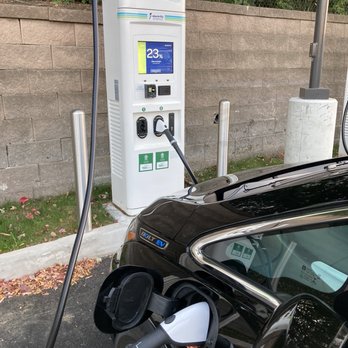
There are several different types of electric cars. These include battery powered, fuel cell and hybrid electric vehicles. There are some differences between the three types of electric vehicle. First, electric vehicles that are battery-powered work on the principle of storing electricity. These vehicles have electric motors, an electric battery, and an Electric Power Control Unit.
These batteries are the most used in electric vehicles. These batteries have a very long driving range. These batteries are expensive. The size and life expectancy of batteries will depend on how they are used. The battery's capacity is a function of how efficient it is at delivering energy.
Regenerative braking is an important feature for electric vehicles. This system uses the kinetic energy generated by the engine during deceleration to charge the battery. Regenerative braking in a conventional hybrid is used for the recharge of the battery. These systems are very energy-saving and can be used to reduce driving time. The Department of Energy estimates that an electric car can recover as much as 34% of the energy that is lost while driving.

The main difference between electric and gasoline-powered cars is the fact that electric cars use only the electricity stored in their batteries to power their wheels. Hydrogen fuel cells are used to power fuel cell cars. These cars offer the greatest benefits, including lower fuel prices. They are available only in certain markets.
To store electricity in an electric car, there is an on-board charge. It can either be plugged into an outlet standard or used as a self-charging system. The self-charging system uses an ultra capacitor module to deliver a controlled charging current.
A dual polar magnetic motor generator generates fast charges. This works with the ultra-capacitors modules to store voltage in the batteries and then discharge it to the lithium batteries. This ensures that the battery's charge is never lost and doesn't go back-charge. The torque can also be increased by using the dual polar magnetic motor.
Ultra-capacitors modules are used for increasing the lithium battery capacity in electric vehicles that are experiencing low levels. The voltage is stored in batteries until the batteries are fully discharged. This allows the dual magnet motor generators to continue running. This is the most popular choice.

There are many types of batteries on the market. However, the lithium ion is the most popular and well-known. The battery can last the entire vehicle's life. For example, the Kia Soul Booster EV's 64 kWh battery can last up 386 km.
An in-depth knowledge of the components is necessary if you want to buy an electric car. This will help you determine what kind of motor and battery you need for your electric car. This can be tricky so seek professional guidance. It is also important to determine how much electricity you want to supply your electric car. This will have an impact on its performance.
FAQ
What does it take for a mechanic to be a good one?
Expert mechanics take years of practice and extensive experience. It is best to learn how to fix cars under the supervision and guidance of a professional mechanic.
You will have to spend time in a garage learning about cars and mechanics. It is important to get familiar with the mechanics of cars and engineering.
And you'll also need to attend auto school.
The most important thing is to start early. It doesn't matter if you're old or not to study automotive technology. Start studying automotive technology now to become a mechanic.
Is it hard to be a mechanic apprentice?
Although it's not an easy task, you will learn quickly and have many opportunities to advance.
You need to have patience and perseverance. Also, you must know how to fix trucks, cars, and motorcycles.
Customers and family members can put a lot pressure on you. They want you to succeed. However, you shouldn't be forced to make difficult decisions.
This is a career that you might enjoy if you are passionate about fixing cars. This job allows you to make a decent wage and build up your company.
Perhaps you prefer a different route. In this case, you could consider becoming a technician instead.
This could involve using your technical knowledge to support other employees. You might be able to assist technicians in troubleshooting problems or teach them new techniques.
Another option is to become an advisor in service. You will offer assistance and advice to customers when they bring cars to a garage.
Your decision depends on what you want to do. There are many options and you have the ability to choose the one that is right for you.
Is automotive mechanic a promising career?
If you are determined to excel, the automotive industry offers many opportunities. Working hard and learning from others is the best way to be successful in this field.
Communication skills are important as customers and coworkers will often be your main focus. You must also be willing and able to travel long distances, which can make it difficult to commute.
If you are interested in a career working in automotive, then consider attending classes at community colleges. Many schools offer programs specific to students interested in sales, auto repair, or customer service.
Mechanical engineering is a good choice if you are interested in pursuing a degree. You can earn a bachelor's in as little four years.
Many companies will hire students straight out of college. So it's wise to start looking for employment while you still have the chance to study part-time.
After your education is complete, you will probably need some training in order to become an automotive technician.
You will need to pass the Automotive Service Excellence certification exam. This test covers topics including engine maintenance, brakes, steering systems, suspension, and more.
Once you have passed the ASE Test, you are eligible to apply for a National Institute for Automotive Service Excellence License.
Private individuals can have their vehicles repaired with a license. In exchange, you'll receive compensation based on the number of services performed.
Not all states require licensing. If you intend to work in another state, however, you will need a license.
Some states won't issue licenses until you have completed a certain amount training. If this is you, you may need another option.
What are the qualifications for an automotive technician
You need to have high school diploma or GED and good grades in English as well as maths. You must also be able to read, and write. The written test will be passed and you will then have to take several practical exams before you can begin work.
What qualifications do I need to become a mechanic?
A series of tests is required to be a mechanic. These exams include:
-
A general knowledge assessment
-
A practical exam
-
An apprenticeship test
These tests are intended to make sure you have a solid understanding of the basics of mechanics before you can start your career as a mechanic.
Once you pass these tests you can become a mechanic. But, you will still need an apprenticeship. This will involve trade training.
To fully understand the mechanics of vehicle repairs, you'll need workshops and classes. Additionally, you will need to work with experienced mechanics.
You'll need a high level of concentration and attention to detail if you want to succeed as a mechanic. You'll need to pay close attention to every aspect of vehicle repairs.
To become a good mechanic, you need patience and persistence. This may not be the career path that you want if you aren't able to follow directions.
This job is for you if you are passionate about cars and love fixing them.
What qualifications does a truck mechanic need?
While you may not have the formal qualifications to perform this job, your skills are well-rounded in working on engines and trucks. You are a valuable asset as you can quickly diagnose and solve problems efficiently.
Additionally, you have a solid knowledge of diesel technology that will enable you to determine what parts are necessary to repair our vehicles.
Statistics
- There were 749,900 jobs available for automotive service technicians and mechanics in 2016, which is expected to grow by six percent through 2026. (jobhero.com)
- According to the BLS, the median annual salary for automotive service technicians and mechanics in the United States was $44,050 in May 2020. (uti.edu)
- The U.S. Bureau of Labor Statistics (BLS) reports that the job outlook for automotive service technicians and mechanics is expected to decline by 4% from 2019 to 2029. (indeed.com)
External Links
How To
How to protect yourself against auto mechanic frauds
Consumers are often victims of auto mechanic scamming. On average, a consumer spends $1500 per year on auto repairs. This means there are many people who will take advantage of this situation. If you are aware of what to look out for, you can avoid falling for scammers. These are some ways to spot scammers before they take your money.
-
Never pay upfront. It is likely that someone will ask you to pay them upfront. Always ask for payment once work has been completed. You can call the Better Business Bureau (BBB) at 1-888-322-8138 if you are unsure if something is legal. They can provide guidance and assistance.
-
Ask for references. You can contact former customers to confirm that you are dealing with a trustworthy service provider. Also, it's a good idea check online reviews. Make sure that any business you deal with has a positive reputation.
-
Conduct background checks. Background checks are essential for hiring anyone. To see if the company has any complaints, check the BBB website. Also, ensure that the vehicle's license number belongs to the person who owns the business.
-
Don't be afraid to walk away. Sometimes, even if the business appears legit, they will try to con you into paying too high. If you feel cheated, don't hesitate leaving. There are many other businesses that you can choose from.
-
Don't be fooled by "free" services. There are lots of companies that offer free estimates or free inspections. These companies will often charge you exorbitant fees later. Before agreeing to any agreement, always ask about any additional costs.
-
Avoid being pressured. When a company offers you a great deal, it's because they think they can get away with charging you less than you deserve. If you find yourself in a situation where you are being pressured to buy something, it's likely a scam.
-
You should look for high-quality products. When looking for a repair shop, you want to ensure that they use high-quality parts. You shouldn't use cheap brake pads if you need them. Instead, go to a shop specializing in brakes.
-
Get multiple quotes. It is important for you to compare prices among different shops. Comparing prices between shops will give you a better chance to find a fair price.
-
Keep records. Keep track of everything related to your repair. This includes invoices, receipts, and warranties. It is also a good idea to keep track of any addresses or phone numbers that you receive.
-
Keep updated